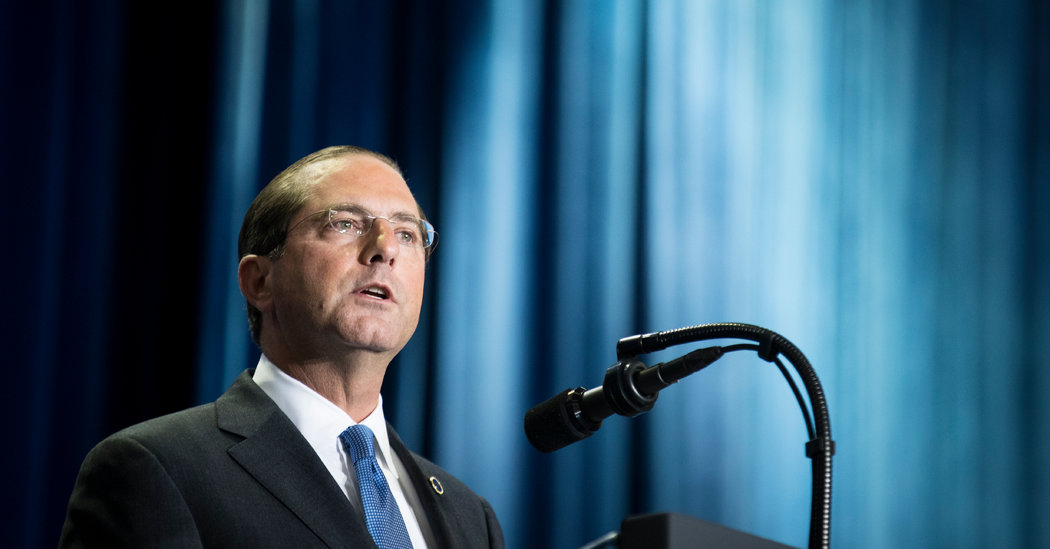
The Trump administration said on Wednesday that it was taking steps to make it easier for less expensive prescription drugs to be imported from other countries, particularly Canada, a move that has long been supported by progressives but has encountered fierce opposition from the pharmaceutical industry.
Under the plan, the administration said it would propose a rule to permit pilot programs developed by states, pharmacies or drug distributors that sought to safely import prescription medications from Canada. The Food and Drug Administration also planned to advise manufacturers for how they could import high-priced drugs like insulin that are sold more cheaply in other countries.
“President Trump has been clear: For too long American patients have been paying exorbitantly high prices for prescription drugs that are made available to other countries at lower prices,” Alex M. Azar II, the secretary of health and human services, said in a statement released Wednesday.
Although the announcement signaled a major policy shift because Democratic and Republican administrations have generally opposed importing drugs from overseas, the proposal was also limited in nature. The proposed rule would not apply to high-priced drugs like insulin or biologic drugs like Humira, because of exceptions included in earlier legislation. And the F.D.A. guidance would only permit importation of drugs, including insulin, if the drug makers agreed to take part in the plan.
Democrats and Republicans in Congress have been debating legislation that would allow importation of drugs to obtain cheaper prices, and other measures to try to rein in costs. But leading members of Congress have said that major proposals won’t be fully prepared before September.
The rising price of prescription drugs has been a popular topic at the Democratic presidential debates, and the timing of the administration’s announcement fell in the middle of the Tuesday-Wednesday schedule of this month’s debates for the Democratic candidates.
On Tuesday night, Senator Bernie Sanders of Vermont, who has long supported the idea, said he traveled to Canada on Sunday with a group of consumers who were buying insulin at what they said was one-tenth the price they usually pay in the United States. Higher prices are being charged by “the crooks who run the pharmaceutical industry in America today,” Mr. Sanders said.
Many other countries are able to negotiate lower prices because their health care systems are run by the government, giving them more leverage. In the United States, private insurers typically negotiate with drug companies on prices. The drug industry has said that the prices overseas are artificially low and that people in those countries often don’t get access to as many new drugs as Americans do.
The new policy is an about-face for Mr. Azar, who like other Republicans has been skeptical about importing drugs from other countries. The idea had also been rejected by previous commissioners of the Food and Drug Administration, including Margaret Hamburg, who raised concerns about importing counterfeit products.
In May 2018, Mr. Azar called the idea a “gimmick” and said: “They are a lovely neighbor to the north, but they’re a small one. Canada simply doesn’t have enough drugs to sell them to us for less money, and drug companies won’t sell Canada or Europe more just to have them imported here.”
But over the past year, the tone has shifted as Republican state leaders have joined Democrats in talking about importing drugs from Canada. The Florida governor, Ron DeSantis, has said he wants to be able to do so, and in May Mr. Trump directed Mr. Azar to help make it happen. Vermont also has a law allowing importation although it has not gotten federal approval.
Canadian officials have warned the United States government that importation programs could jeopardize their own supply of drugs, leading to potential shortages, according to a Reuters report this month. Others have said drug companies could limit their supplies to those countries or raise their prices in response to any new American policy.
Mr. Trump has railed against the idea that many countries pay less for drugs than in the United States, calling it a form of “global freeloading” because many treatments sold overseas were developed by American companies.
In July, Mr. Trump said he was planning an executive order, a “favored-nation clause,” which would allow the United States to pay whatever the lowest price is in other countries. But his comments were vague, and it was unclear whether he was referring to a more limited pilot program being proposed by his administration that would apply only to a small subset of drugs administered by doctors and in clinics. There were also questions about how far any executive order could go without congressional legislation.
Several of Mr. Trump’s other proposals to lower drug prices have faltered recently, including efforts to force drug companies to list their prices on TV ads.
[Like the Science Times page on Facebook. | Sign up for the Science Times newsletter.]

